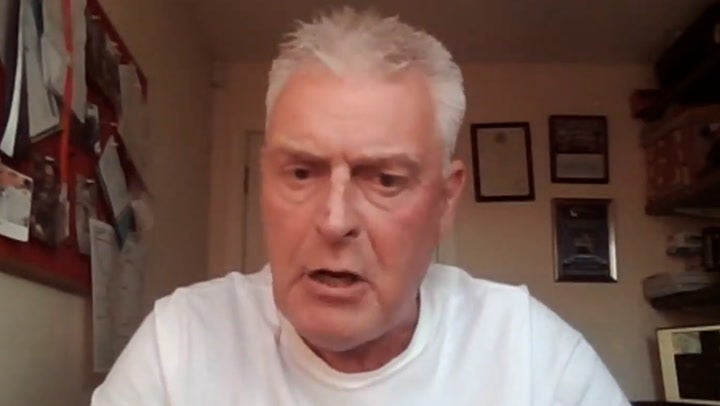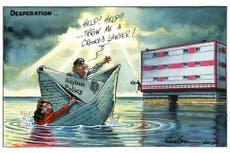Never mind the politics, here’s the Nasty Party
The shift to ‘culture war’ issues may simply be a sign that the Tory party have run out of ideas and talent, writes Sean O’Grady. Or, it’s a cynical calculation in the dark arts of politics. Either way, it is time for a change...


Your support helps us to tell the story
From reproductive rights to climate change to Big Tech, The Independent is on the ground when the story is developing. Whether it's investigating the financials of Elon Musk's pro-Trump PAC or producing our latest documentary, 'The A Word', which shines a light on the American women fighting for reproductive rights, we know how important it is to parse out the facts from the messaging.
At such a critical moment in US history, we need reporters on the ground. Your donation allows us to keep sending journalists to speak to both sides of the story.
The Independent is trusted by Americans across the entire political spectrum. And unlike many other quality news outlets, we choose not to lock Americans out of our reporting and analysis with paywalls. We believe quality journalism should be available to everyone, paid for by those who can afford it.
Your support makes all the difference.The most depressing thing about the Tories running about 20 points behind Labour in the polls is that they’ve clearly decided they can’t win the next election on the usual issues that decide such contests – the cost of living, the economy more generally, public services – and have instead decided to try and win on so-called “culture war” battlegrounds – migration (sometimes laced with a hint of racism), bogus stuff about motoring, scare stories about the environment, crime and trans rights.
Maybe this betrays the continuing influence of the Lynton Crosby school of politics; or it is simply a sign that they’ve run out of ideas, and talent. In any case, they have also been adopting a new, more brutal language delivered in a coarser style, epitomised in Lee Anderson’s notorious remark that refugees can “f*** off back to France” if they find the prospect of incarceration on a modern-day prison hulk not to their liking (or all too reminiscent of some squalid cell in Raqqa).
Just to remind everyone, this poseur is the deputy chairman of the Conservative Party, and what might be called a token member of the working classes (he was once a miner). It seems he was appointed, cynically and patronisingly, by the public-school smoothies who actually run the Tories as a way of communicating with the voters in the red wall. Given that those people are just as fair-minded and decent as the people in the blue wall in the home counties, it is not obvious that they will respond with much more sympathy to Anderson’s callous remarks. People who live in Nottinghamshire are no less humane or intelligent than those who live in Buckinghamshire, you know, and someone should remind the Tory high command of that.
Others, such as Suella Braverman, aren’t as foul-mouthed as Anderson, but express much the same sort of sentiment, “dreaming” of packing quite genuine victims of rape and torture off to Rwanda, resenting the “invaders” in the small boats, and wanting to “get rid of all the woke stuff”, which is of course “dog whistle” for rolling back human rights, equal rights and enabling hate speech.
Even those who should know better, such as the justice secretary Alex Chalk, chime in, with Chalk backing Anderson as expressing in his “salty” way the “righteous indignation” of the British people. Rishi Sunak, who is comically ill-suited to the role of political street fighter, smilingly presides over the drift to populo-fascism. A hardline Thatcherite and true Eurosceptic, Sunak – despite his impeccable manners and head boy demeanour – is not as nice as he seems, either.
We are in fact witnessing the unwelcome re-emergence of the Tories as “the nasty party”, and indeed a rather snarlier and more sweary version.
It was the label famously pinned to them some twenty years ago by their own then chair of the party, Theresa May. Back in 2002 they were still recovering from the double beating they received at the 1997 and 2001 elections, an era during which ever more extremist, Eurosceptic, Thatcherite, socially conservative and borderline racist attitudes yielded meagre electoral reward.
It was not only the high noon of New Labour, but of William Hague’s campaign to “save the pound”, of the highly problematic views of Ann Widdecombe as shadow home secretary and the “common sense agenda”. So far from re-learning any lessons about how to win the elections, the Tories lurched even further to the right and – astonishing then and even more so now – pinned their dwindling hopes on Iain Duncan Smith and the activists elected him leader of the opposition.
It was at this point that May, no one’s idea of a liberal, but keen on power, decided to give them a jolt at the 2002 party conference. A few home truths about style and image needed to be delivered. The relevant passage is rarely quoted in full, but it gives the right context to her essential message. It is, in its way, also a warning from history, and reads eerily well today:
“Let’s not kid ourselves. There’s a way to go before we can return to government. There’s a lot we need to do in this party of ours. Our base is too narrow and so, occasionally, are our sympathies. You know what some people call us? The nasty party. I know that’s unfair. You know that’s unfair, but it’s the people out there we need to convince – and we can only do that by avoiding behaviour and attitudes that play into the hands of our opponents ... I want us to be the party that represents the whole of Britain and not merely some mythical place called ‘Middle England’, but the truth is that as our country has become more diverse, our party has remained the same ... Ask yourselves: how can we truly claim to be the party of Britain, when we don’t truly represent Britain in our party?”
How indeed, and how will they do so in 2024 when they appeal to a mythical constituency that no longer exists?
In one of his more insightful reflections, Anderson once admitted to an interviewer how he’d won the traditionally Labour constituency of Ashfield: “The big thing in terms of 2019, there were three things that won us the election. It was nothing to do with me, it was Brexit, it was Boris, it was Corbyn and it was as simple as that. Those three things together were a great campaign, great ingredients … At the next election we haven’t got those three things, so we’ll have to think of something else. It’ll probably be a mix of culture wars and trans debate.”
Correct; and they’re obviously thrashing around for convincing “dividing lines” with Labour. They might have had a chance with the nasty agenda, but, thanks to Liz Truss, they’ve lost much of their reputation for economic competence (however illusory it actually was); Johnson himself and a galaxy of perverts and misfits have added fresh layers of sleaze to their image; and they are as bitterly divided as they were a quarter of a century ago, and on much the same issues, especially Europe.
By the time May delivered her blunt speech – one that landed her in trouble but served her well in the longer run – the voters had long since stopped listening to anything Tories had to say about anything, and it’s the same now, even if they’re shouting and swearing these days.
Then as now, the nasty party have had their chance. Time for a change.



Join our commenting forum
Join thought-provoking conversations, follow other Independent readers and see their replies
Comments